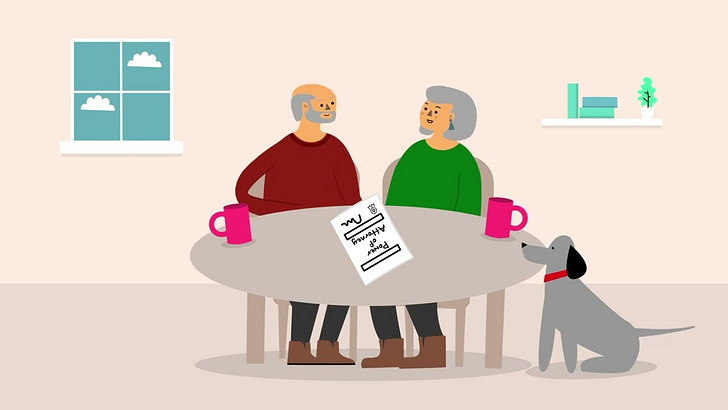'The Eldercare Discussion'
Heartfelt conversations with resources, open questions and active listening.
Hello, Dear Reader! Welcome to our new Carer Mentor community members!
I’m Victoria. You can read why I’m publishing Carer Mentor here: Who Started Carer Mentor and Why?
Have you thought about broaching the topic of Eldercare with your parents or loved ones?
What specific words, phrases, or conversation starters have you used to initiate the discussions?
What worked or didn’t, and why? Can you share your learnings?
What emotions, interpersonal dynamics, and behaviours have you observed during these conversations, either from yourself or your loved one or as an observer?
Has the conversation evolved? Stalled? Have you managed to restart the conversation?
What connections, talks, and conversations are you having to plan for your future care—with whom, how, when, and why?
Have you started to plan for when you’re older?
Empathy and initiating eldercare conversations.
As parents/loved ones become more frail, the need to discuss Eldercare looms large.
At the start, there is always an uncomfortable disconnect, a mismatch of expectations or a misinterpretation of a person’s intent that can result in frustration, angst, and fear.
When frailties appear, so does the reality that we are mortal and vulnerable. However, there are many ways to preserve our independence for longer. For example, there are many workarounds for routine, everyday functions around the home that can be easily installed.
How agile and open can they/we be? What’s an acceptable incremental change to our routine or ‘way of doing things’?
What are their/our wishes or big ‘No-ways’?
We can do everything we can to stay fit as we age AND make plans to prepare for the future. These two things are not mutually exclusive.
There are no easy answers, standard solutions, or easy fixes to having a productive eldercare discussion. After all, we’re human, so we have many emotions and a lifetime of preferences to navigate.
But I’ll tell you a secret: what may start as a big ‘NO’ can shift to a maybe and an ‘Ok, sure, let’s try it.’
I’ll also tell you straight: many times, an unpreventable crisis occurs that causes people to shift their priorities from wishes to needs/must-haves to mitigate risks or ensure safety and well being.
My number one recommendation is to talk, talk, and talk with open, gentle curiosity.
Don’t enter into a discussion with assumptions, an agenda, or the expectation that it will be a ‘one-conversation-and-done’ event.
Regardless of whether you are the instigator of the conversation, the one who needs more support or the worried loved one/family member/friend, connecting, talking, and reaching out for help is vital.
This is not a project, a tick-box to be managed. It’s a life-changing period and transitioning phase where MANY emotions and dynamics will appear. Even when you’ve completed essential documents, there are still conversations, reminders, and possible revisions.
I recommend creating a ‘warm’ space for openly exchanging thoughts and ideas. Be ready to invest quality time in the conversations.
We can normalise these discussions, remove discomfort and defuse the emotionally charged reticence that usually accompanies the topic of care, wills, probate, etc.
I’d invite anyone with experience or questions to write an article or comment below. We need to talk about this more and help each other.
An empathetic perspective:
Reread this article as
an adult child to parents needing eldercare,
as you now planning for your eldercare future,
as your friends/executor/children talking with you when you’re older.
Reframing wishes and needs can help us plan for different scenarios and how we engage with others in these discussions. We can’t control the feelings, actions or words of others. However, we can anticipate how we’d like to act and behave in each scenario.
As a long-term caregiver, I’ve had a lot of time to consider all sorts of scenarios, given the rollercoaster journeys I’ve been on and those I’ve witnessed.
Resources to inspire your plans and discussions
Below are some resources about conversations and Eldercare in general.
Eldercare locator (USA specific)
They have online resources/guides and directories for just about anything, and if you need to talk to someone to figure out WHAT resources might be helpful, you can call them. I knew some of the folks who staffed the Locator phone lines -- they're information/referral specialists and extremely kind and helpful. Their whole job is to help you navigate the system and get connected to people in your/your loved one's area who can help.
A Beginner's Guide to the End: Practical Advice for Living Life and Facing Death
The Conversation Project - Conversation Starter Guide Helping people share their wishes for care through the end of life. Free resources and guides
Five Wishes - (US organisation) The nation’s only national advance care planning program. Providing peace-of-mind for more than 25 years.
The Farewelling Worksheet: Planning for Yourself - “This funeral pre-planning checklist is for those who believe that thinking about--and planning for--end of life is part of living with intention and self-awareness, not to mention being helpful to family! We’ve organized the process into five sections to make it easier to navigate.”
Get Your Shit Together, Founded by Chanel Reynolds, Author of What Matters Most. Co-founder of GYST.com
Making provision for your Digital Assets in your Will (UK based) Just Wills Legal service
3. Other Carer Mentor articles (UK Specific)
4. Other publications sharing great advice and resources (US specific) :
Amy Brown In caring for ageing parents, can we see assisted living as assisted loving
Amy highlights the organisations - ‘Senior Living Selections’ and ‘A Place for Mom’
Please ‘❤️’ LIKE & consider subscribing!







This is a great resource for planning: https://getyourshittogether.org/?amp